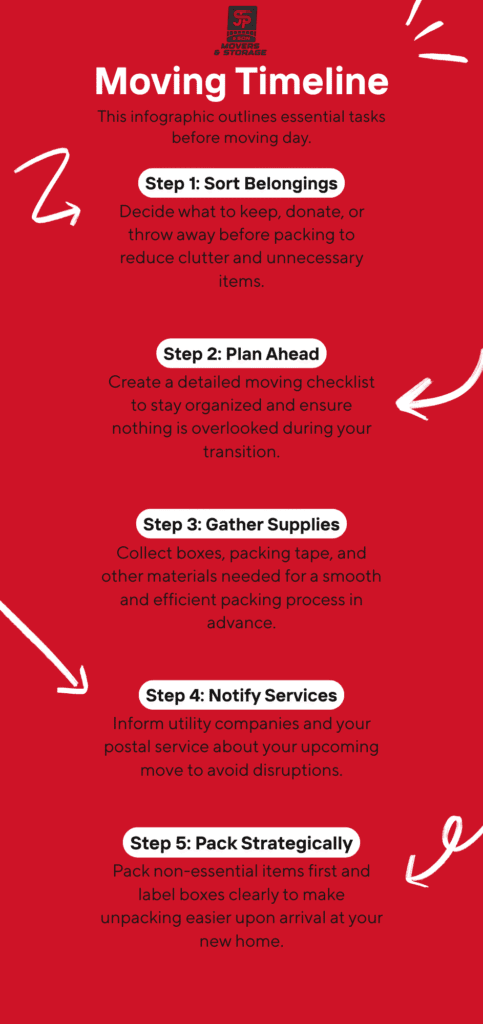
How to Choose the Best Moving Company in Virginia (Checklist Included)
Moving can be both an exciting and stressful experience.
Whether you’re relocating within Virginia or moving to the state for the first time, selecting the right moving company is crucial to ensure a smooth transition.
With numerous options available, it’s essential to make an informed decision to protect your belongings and peace of mind.
This comprehensive guide will walk you through the process of choosing the best moving company in Virginia.
We’ll cover everything from understanding your specific moving needs to researching potential movers, comparing estimates, and preparing for moving day.
Additionally, we’ve included a detailed checklist to help you stay organized throughout the process.
Understanding Your Moving Needs
Local vs. Long-Distance Moves
The first step in selecting a moving company is determining the scope of your move.
Local Moves: Typically within 50 miles, often charged by the hour.
Long-Distance Moves: Over 50 miles or across state lines, usually priced based on weight and distance.
Understanding the type of move will help you identify companies that specialize in the services you require.
Residential vs. Commercial Moves
Different moving companies cater to various clientele:
Residential Movers: Focus on household relocations, offering services like packing, loading, and unpacking.
Commercial Movers: Specialize in office moves, handling equipment, documents, and minimizing business downtime.
Ensure the company you choose has experience relevant to your move type.
Special Considerations (e.g., Antiques, Pianos)
If you have items that require special handling, such as antiques, pianos, or artwork, confirm that the moving company has the necessary expertise and equipment.
Specialized services may incur additional costs but are essential for the safety of valuable items.
Researching Potential Movers
Checking Licenses and Certifications
Legitimate moving companies should have proper licensing:
Interstate Movers: Must be registered with the U.S. Department of Transportation (USDOT) and have a USDOT number.
Intrastate Movers: Should comply with Virginia state regulations.
You can verify a company’s USDOT number on the FMCSA website.
Reading Reviews and Testimonials
Online reviews provide insight into a company’s reliability and customer service.
Check platforms like Google, Yelp, and the Better Business Bureau.
Look for consistent positive feedback and how the company addresses complaints.
You can check out our Google Reviews Here
Comparing Services Offered
Not all moving companies offer the same services.
Some may provide packing and unpacking, storage solutions, or specialty item handling.
Make a list of services you need and ensure the company can accommodate them.
Getting and Comparing Estimates
In-Home vs. Online Estimates
Obtaining multiple estimates helps in making an informed decision:
In-Home Estimates: Allow movers to assess your belongings accurately, leading to more precise quotes.
Online Estimates: Convenient but may be less accurate due to the lack of physical assessment.
Always get estimates in writing and ensure they include all potential charges.
Understanding Binding and Non-Binding Quotes
Binding Estimate: A fixed price that won’t change unless you add services.
Non-Binding Estimate: An approximate cost that may increase based on actual weight or services.
Clarify the type of estimate provided to avoid unexpected costs.
Hidden Fees to Watch Out For
Be aware of additional charges that may apply:
Stair Fees: For moves involving multiple flights of stairs.
Long Carry Fees: If movers have to carry items a long distance from your home to the truck.
Packing Materials: Charges for boxes, tape, and other supplies.
Discuss all potential fees upfront to prevent surprises.
Evaluating Experience and Expertise
Years in Business
A company’s longevity can indicate reliability and experience. Established movers are more likely to have refined processes and trained staff..
Specializations (e.g., Military Moves, Senior Relocations)
Some companies specialize in specific types of moves:
Military Moves: Understanding of military regulations and timelines.
Senior Relocations: Sensitivity to the needs of older adults.
Choose a mover with experience relevant to your situation.
Training and Background Checks for Staff
Inquire about the company’s hiring practices:
Training Programs: Ensure staff are trained in proper lifting techniques and customer service.
Background Checks: For the safety of your belongings and household.
A reputable company invests in its employees’ professionalism.
Insurance and Liability Coverage
Types of Coverage Offered
Moving companies typically offer:
Released Value Protection: Basic coverage at no extra cost, offering minimal reimbursement.
Full Value Protection: Comprehensive coverage for repair, replacement, or reimbursement.
Understand the extent of coverage and consider purchasing additional insurance if necessary.
Understanding Your Rights and Responsibilities
Familiarize yourself with the FMCSA’s “Your Rights and Responsibilities When You Move” booklet.
It outlines important information about estimates, contracts, and dispute resolution.
Preparing for Moving Day
Packing Services and Supplies
Decide whether to pack yourself or hire professionals:
Self-Packing: Cost-effective but time-consuming.
Professional Packing: Saves time and ensures items are packed securely.
Ensure you have adequate supplies: boxes, tape, bubble wrap, and markers.
Storage Options
If there’s a gap between moving out and moving in, consider storage solutions:
Short-Term Storage: For brief periods, often offered by moving companies.
Long-Term Storage: For extended durations, may require a separate facility.
Discuss storage needs with your mover in advance.
Timeline and Scheduling
Create a moving timeline to stay organized:
8 Weeks Out: Begin researching movers.
6 Weeks Out: Declutter and start packing non-essentials.
4 Weeks Out: Confirm moving details and continue packing.
1 Week Out: Pack essentials and prepare for moving day.
Sticking to a schedule reduces last-minute stress.

Red Flags and How to Avoid Scams
Common Moving Scams
Be cautious of:
Large Upfront Deposits: Reputable movers typically require payment upon delivery.
Lack of Physical Address: A legitimate company should have a verifiable location.
Name Changes: Frequent name changes can indicate a company is avoiding negative reviews.
Tips to Protect Yourself
Verify Credentials: Check licenses and insurance.
Get Written Estimates: Avoid verbal agreements.
Read Contracts Carefully: Understand all terms before signing.
Trust Your Instincts: If something feels off, consider another company.
The Ultimate Moving Checklist
8 Weeks Before Moving
Research and shortlist moving companies.
Request in-home estimates.
Declutter and donate unwanted items.
4 Weeks Before Moving
Confirm moving date and services.
Begin packing non-essential items.
Notify utilities and change address
1 Week Before Moving
Pack a “first-night” box with essentials.
Confirm arrival time with movers.
Clean your current home.
Moving Day
Ensure all boxes are labeled.
Keep important documents with you.
Do a final walkthrough before leaving.
Quick Takeaways
Assess Your Needs: Determine the type of move and any special requirements.
Research Thoroughly: Check licenses, read reviews, and compare services.
Understand Estimates: Know the difference between binding and non-binding quotes.
Check Insurance: Ensure the company offers adequate coverage.
Be Prepared: Use a checklist to stay organized throughout the moving process.
Choosing the right moving company in Virginia requires careful consideration and thorough research.
By understanding your specific needs, evaluating potential movers based on key criteria, and staying organized with a comprehensive checklist, you can ensure a smooth and stress-free moving experience.
Remember to start early, ask the right questions, and don’t hesitate to seek recommendations.
Your perfect move begins with the right choice.





